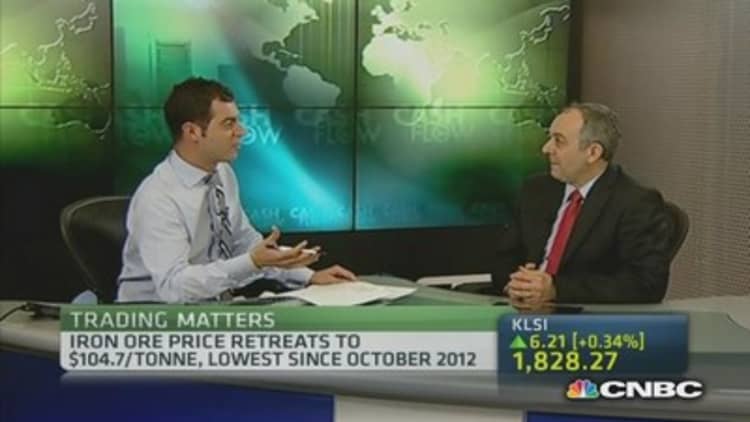Asian stocks overcame an uninspiring handover from their U.S. counterparts to trade higher on Tuesday, after posting steep declines in the previous session. However, trade in Sydney and Shanghai was choppy amid fears of an economic slowdown in the latter.
U.S. stocks fell on Monday, as data over the weekend showed a deceleration in China's exports, sparking worries about the health of the global economy.
The Dow Jones Industrial Average shed 0.2 percent. Boeing was the biggest blue-chip loser.
The plane maker on Friday said "hairline cracks" had been found in the wings of roughly 40 787 Dreamliners currently in production. Meanwhile, the search for a 777-200 plane with 239 people on board that vanished during a Malaysia Airlines flight to Beijing on Saturday continues.
Tokyo 0.7% higher
Japanese shares regained most of Monday's losses on Tuesday. The benchmark Nikkei index took a beating in the previous session, on the back of poor domestic economic data.
However, trading volumes were thin, signalling that investors remain cautious over China's economic slowdown and uncertainty in Ukraine.
Exporter stocks enjoyed an upbeat session, as the yen remained above the 103 level against the greenback. Automaker Honda Motor led the gains with a near 3 percent rally.

Carmaker Toyota Motor finished 0.4 percent higher on Tuesday. Reports said that the automaker may be planning to hike average pay for the first time in 6 years.
Commodity stocks also saw strong gains, after heavy selling on Monday. Showa Shell surged 1.6 percent.
Meanwhile, the Bank of Japan (BOJ) announced that it would hold it monetary stimulus in place, in line with expectations.
Tuesday also marks the third anniversary of the earthquake and tsunami that devastated coastal areas of Japan's Tohoku region in 2011.
(Read more: Japan's energy debate rages on tsunami anniversary)
Shanghai inches up 0.1%
Mainland shares rebounded slightly on late Tuesday, helping the Shanghai Composite index to edge above the 2,000 level.
The key index had fell below the support level for the first time since January 21 on Monday, after the world's second largest economy posted below-view export data.
Property stocks were among the top gainers. Vanke climbed 5 percent while Poly Real Estate advanced 4.5 percent.
Commodity stocks remained downbeat. Baotou Steel slid 1.3 percent.
Meanwhile, investors digested news that the Chinese government may launch a pilot test for privately owned banks in regions of Tianjin, Shanghai, Zhejiang and Guangdong. According to Reuters, the move will be the first tentative step by the country to open its closely-guarded banking sector.
(Read more: Yuan weakness adds wrinkle to EM debt concerns)
Sydney flat
Australian shares edged up slightly at the end of Tuesday's trade. The key index had been trading rangebound between 5,404 and 5,433 points.
Resource stocks continued to be in focus, as iron ore prices suffered a steep loss of $10 overnight.
Losing midday gains, BHP Billiton fell back into negative territory with a 0.6 percent slide, while Fortescue Metal finished 1.9 percent lower. Rio Tinto lost early gains of nearly 1 percent to trade flat at the end of Tuesday.

Dale Gillham, Chief Market Analyst at Wealth Within, told CNBC's Cash Flow that investors should not be too worried about recent declines in resource stocks.
"If you bring in monthly stock charts of BHP Billiton and Rio Tinto, you will see they have very consistent 5-year cycles. It's clockwork and never not done so that is what's happening right now."
"The catalyst at the moment is the iron ore prices, but we are staying down simply because of the (5-year cycles). These stocks probably have a little more to drop, but not too much more," he added.
Rare earths miner Lynas tanked 8.5 percent, after it warned on Tuesday that it will likely need to raise new funds or seek a reprieve from its lenders in the next 12 months or could face the risk of bankruptcy. Earlier in the session, it plunged as much as 17 percent to a five-year low.
(Read more: Japan tsunamidisaster, three years on)
Seoul up 0.5%
South Korean shares rebounded from a one-week low near midday and eventually finished half a percent higher on Tuesday.
Earlier in the session, the benchmark Kospi index had touched an intraday low of 1,951, its lowest level since February 24.

Kia Motors rallied 1.9 percent, on bargain hunting following steep declines in recent sessions.
Dongbu Steel and Hyundai Steel fell 3 and 0.5 percent, on worries that steel demand would weaken following a slowdown in China.
Kuala Lumpur adds 0.3%
Malaysian stocks finished in the green on Tuesday. Focus remained on news of its missing Malaysia Airlines flight 370 which lost contact with air traffic control Saturday morning.
Shares of the air carrier rebounded 2 percent, after tanking nearly 18 percent on Monday.
— Follow us on Twitter: @CNBCWorld

